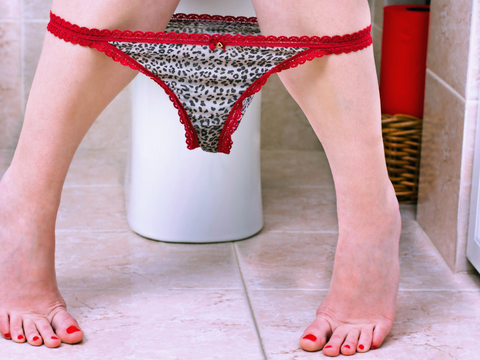About Vaginal Yeast Infections

Did you know that you have trillions (with a “t”) of microorganisms living in your body? These include bacteria, fungi, viruses, and all sorts of other single-cell or multi-cell critters. Some of them are helpful and others, well, not so much.
Most people have heard of good bacteria, the ones that support your immune system, help you digest food, and fight off bad bacteria. There are even helpful viruses. Some of the viruses are bacteriophages, meaning that they will infect a bacterium. They’re harmless to humans but lethal to bad bacteria.
And what about the fungi? Well, there’s yeast, and that’s a good thing. Yeast is part of the natural mix of microbiomes that live in your gut and one important thing it does is help absorb vitamins and minerals from your food. But, like anything else, it’s possible to have too much of a good thing.
An overgrowth of yeast can create all sorts of unwanted symptoms, not the least of which is a vaginal yeast infection. Symptoms can include intense itching of the vagina and the vulva, irritation, a discharge, vaginal pain, and others. The most common type of yeast infection is caused by a fungus called Candida albicans.
How Does This Even Happen?
Most women have a certain amount of Candida albicans in their bodies and it’s not at all problematic until there’s too much of it. Typically, the body’s good bacteria keep the Candida levels in balance and under control. When the body’s good bacteria are interfered with, it can lead to a Candida overgrowth.
Some of the factors that can disrupt the levels and functioning of good bacteria are:
(scroll down to read more)
Taking antibiotics. Antibiotics are undoubtedly one of the most significant developments ever in healthcare. They work by killing bacteria and preventing them from spreading. The use of antibiotics has saved countless numbers of people from debilitating or even lethal bacterial infections. A downside with antibiotics, and particularly the broad-spectrum antibiotics, is that they can also kill the good bacteria that protects the body from fungal infections.
A diet high in refined sugar and refined carbohydrates. Candida loves sugar, so much so that, according to Dr. Maura Scanlan, it will actually create a craving for sugar. When this craving is satisfied by eating more sugar, the candida grows and demands more and more sugar. The more sugar you eat, the more the Candida thrives and the stronger the cravings for more sugar can get. Candida may have created perpetual motion, not in a good way.
High alcohol intake. There is a myth that alcohol will kill Candida. It simply is not true. Ethanol may be an effective antifungal agent, but alcohol does not contain enough ethanol to combat Candida. In fact, excessive alcohol actually encourages fungal and bacterial overgrowth. It can also cause leaky gut, a condition where the barrier between the bloodstream and the gut is breached and harmful substances are allowed to infect the bloodstream.
A weakened immune system. Your immune system, assuming it’s in good shape, recognizes and fights to destroy harmful fungus. A weakened immune system is less able to do its job. There are some diseases such as mononucleosis, measles, and flu that can temporarily weaken your immune system. More serious infections such as HIV destroy the white blood cells. Certain drugs can also suppress the immune system. These things can be hard to avoid and hard to control, but there are some factors that harm your immune system that you can control. According to Dr. Michael Nowazek, “the top three [dietary] things that will weaken your immune system are refine sugar, alcohol, and processed foods”. Other more easily controlled factors affecting the immune system can include obesity, lack of exercise, lack of sleep, and smoking.
Using oral contraceptives. Research indicates that while oral contraceptives do not cause vaginal yeast infections, the ones containing estrogen and/or progastrin could create an environment in which the yeast can grow by causing the vagina to produce more sugars.
Tight pants and non-cotton underwear. Synthetic fabrics such as nylon and polyester don’t “breathe”. They trap heat and moisture, making a rich environment for yeast (and also for bacteria that cause UTIs). Cotton is a natural fiber that helps with drying up moisture. Spray-on type pants like skinny jeans also cut off airflow to the vaginal area. Tight jeans may not cause yeast infection, but they could promote other types of vaginal infections.
Prevention and Treatment
Prevention of yeast infections can be helped with a few simple steps. Apart from avoiding those things that hurt your immune system (sugar, alcohol, processed foods, and tobacco products), eating well, getting some exercise, and all the usual things that promote good health, the Cleveland Clinic has a few other tips:
- Don’t douche. Douching can kill the good bacteria that controls Candida.
- Remove wet clothing as soon as possible.
- Use water-based sexual lubricants.
- Don’t use feminine deodorants or scented tampons or pads.
Many physicians will treat a vaginal Candida yeast infection with antifungal medications. It’s important to follow your doctor’s directions on how to take them. There are over-the-counter treatments, but they can be a bit dodgy if you’re not completely sure that your symptoms are being caused by a yeast infection. The symptoms could be caused by other conditions. It’s always a good idea to consult with a healthcare professional before taking medications of any kind.
Nannopads are all-natural hypoallergenic sanitary pads made of USDA, OCS-certified organic cotton. They are free from chlorine, pesticides, dyes and fragrances and are infused with a proprietary blend of Nannogenic™ Technology that helps to bring relief from menstrual discomfort. You can order yours here.
Want to stay tuned and read more health tips, self-care and health facts? Subscribe to our newsletter email here.




